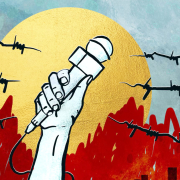|
Getting your Trinity Audio player ready...
|
Image: Wikimedia Commons
By Civil Society Organisations
First published on Daily Maverick
We, the undersigned civil society organisations, write to express our deep concern and strong condemnation of the recent public statements and directives issued by Minister of Sports, Arts and Culture, Mr Gayton McKenzie.
Speaking at a recent signing of stakeholder compacts with public entities falling within the Department of Sports, Arts and Culture (DSAC), the minister said of foreign nationals employed by these entities, “I want them out… Get them out before I get you out.”
He demanded of those in attendance: “If you are [hiring] foreigners… I expect the CEOs, the board chairpersons, and the whole board to take action within two weeks after receiving my letter tomorrow.”
The instruction follows a directive he issued on 28 April 2025 mandating an immediate audit of all foreign nationals employed across DSAC entities. Letters have been issued to these entities, following the finalisation of that audit, which require further particulars of employees and the processes followed prior to their employment.
Minister McKenzie’s actions are morally repugnant and entirely devoid of legal authority. His demand of CEOs that they immediately dismiss foreign employees or face dismissal themselves constitutes an egregious violation of South Africa’s constitutional law, its labour laws, and its international treaty obligations.
South Africa’s Constitution enshrines the rights of everyone — including foreign nationals — to fair labour practices. The minister’s remarks and instructions undermine these rights and amount to unlawful discrimination based on nationality, which is expressly prohibited under both domestic and international law.
Moreover, the threat to summarily dismiss public entity CEOs for failure to carry out illegal instructions constitutes a gross abuse of ministerial power. The Public Finance Management Act and basic tenets of administrative justice do not grant ministers the authority to compel unconstitutional conduct or to bypass lawful grievance and employment processes.
Yet not only does the minister appear entirely ignorant of the basic tenets of the constitutional dispensation under which he serves, he appears to be financially irresponsible as to the resources and funds which the DSAC is required to steward. Should institutions act on the minister’s directives, they will almost certainly face multiple legal challenges. These actions would inevitably result in costly litigation and damages to be funded by the public purse.
Minister McKenzie, in his capacity as a steward of public resources and constitutional values, has a duty to act lawfully, rationally, and in good faith. His directive shows him to be entirely unappreciative of this duty.
His remarks are clearly intended to inflame a dangerous and growing xenophobic sentiment in South Africa. It seems unthinkable that the South African executive would accommodate within its ranks such odious hate-mongering, even as our president visits the United States and rightly calls out the deliberate disinformation being promulgated about South Africa and the incentivising of hate and division, and again rightly insists on the value, dignity, and equality of Palestinian lives.
Those postures can in no way be reconciled with inclusion within the Executive of a minister who actively cultivates cruelty and harm to foreign nationals within our borders, many of whom are lawfully employed and contribute to our communities and country.
Finally, Minister McKenzie’s directive reflects a profound misunderstanding of the very portfolio he has been entrusted to lead. Arts and culture thrive not in isolation, but through dialogue, exchange, and the free movement of people and ideas. The global nature of artistic and cultural expression is not a threat to national identity — it is a cornerstone of its evolution and relevance in the 21st century.
South Africa’s own cultural richness has long been deepened through engagement with international practitioners, historians, educators, performers and scholars. Whether through musical collaborations, museum exchanges, academic residencies, or heritage preservation, the inclusion of foreign nationals has strengthened South African institutions, enriched public understanding and elevated the global visibility of our own cultural output.
To treat the presence of foreign nationals in the arts and culture space as a problem to be purged is to desecrate that space. It is not only legally untenable — it is intellectually impoverished, culturally regressive and diplomatically self-sabotaging.
In light of the minister’s failure to appreciate the obligations of our country’s Constitution, its laws, the limits of his authority, the financial stewardship he is required to observe, and the demands of the portfolio he has been entrusted with, we call for :
- An immediate public retraction of the unconstitutional directive and associated threats;
- A formal apology to the individuals and institutions targeted by the minister’s comments;
- Clear guidance from the Presidency and Cabinet affirming that all employment in the public sector must comply with South Africa’s labour laws and constitutional principles, regardless of nationality; and
- A commitment from the Department of Sports, Arts and Culture to uphold fair employment practices, grounded in our Constitution and our laws.
Issued by:
- Ahmed Kathrada Foundation;
- Campaign for Free Expression;
- Campaign on Digital Ethics (CODE);
- Corruption Watch;
- Council for the Advancement of the South African Constitution (CASAC);
- Defend Our Democracy;
- The Desmond and Leah Tutu Legacy Foundation;
- Foundation for Human Rights;
- The Global Movement Against Statelessness;
- The International Labour Research and Information Group;
- Justice and Activism Hub;
- Media Monitoring Africa;
- Legal Resources Centre;
- Public Affairs Research Institute; and
- SECTION27.







